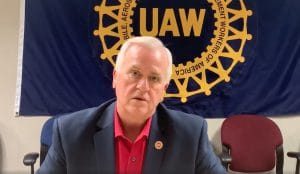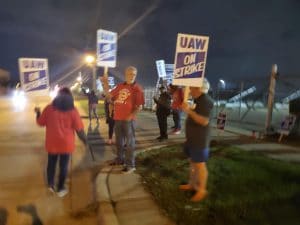
GM executives Mary Barra and Mark Reuss got involved in the discussions on Tuesday, but no deal was reached. Talks will resume Wednesday.
Negotiations between the United Auto Workers and General Motors Co. to end a strike that has cost the company an estimated $2 billion have picked up in intensity in the face of an informal deadline set by the union, which has scheduled a meeting of the UAW’s GM Council in Detroit for Thursday.
GM Chairman Mary Barra and President Mark Reuss, who spent about an hour with the UAW bargaining team, participated in the discussions Tuesday. But the negotiations broke off late Tuesday when continuing discussions failed to produce an agreement on some key issues. The negotiations will resume Wednesday.
Meanwhile, the running commentary by striking union members on social media panned elements of the proposals under discussion, citing items such as the lack of a pay increase in the first year of the contract and the shape of possible agreement on the status of temporary workers.
(GM, UAW Reportedly Closing in on a New Contract)
GM also offered to invest up to $9 billion to upgrades its plants and introduce new products in any new agreement but, so far, the company’s offer has not satisfied the union concerns about job security. The union would like to see GM curtail investment in Mexico and also is seeking pension improvements, which have lagged in the last four contracts with GM stretching back to 2007.

UAW VP Terry Dittes essentially set an informal deadline by calling a meeting of the GM National Council on Thursday.
Throughout the strike, the UAW’s top negotiator, Terry Dittes, has promised that the issues cited by union members will be addressed. Dittes apparently called the meeting of the GM national council in an effort to set a deadline for resolving the dispute and to put additional pressure on the company.
The long strike also has fostered an air of militancy among union members that didn’t seem to exist before the walkout began on Sept. 16.
During the recession, many GM workers were willing to make concessions to keep the company afloat. However, now, after GM played hardball by cutting off health insurance to striking GM workers and their families, things have changed, noted an article in Labor Notes.
“Nobody ever forgets what you do their children,” said GM worker Gene Izzard, a father of four. “And that doesn’t mean we won’t forgive, but we won’t ever forget,” another striker told Labor Notes.
“Before the strike, we had about 20-25% of the membership that would show up for a union meeting. After the strike, we got 99.9% of the membership showing up for meetings, and now everyone knows where the union hall is,” added another union member.
(UAW Summons Council to Meet in Detroit)
In addition, a local union officer was arrested on the picket line in Fairfax, Kansas, following a confrontation with local police. Some local unions also proposed setting up picket lines at GM dealerships — not just plants, the union confirmed. The proposal is being reviewed by the union’s legal staff.
The union also is continuing to pick up support from other unions. Willy Adams, president of the ILWU, which represents longshoreman and warehouseman along the West Coast showed up on the Flint, Michigan, picket line in a show of support for striking UAW members.
Bank of America Analyst John Murphy says the UAW strike has now cost GM about $2 billion through the first four weeks.
“A prolonged strike could burn significant cash and bring GM to its knees, but investors likely will also react negatively if management is perceived to have caved into labor’s demands and GM’s long-term competitiveness is threatened.”
He estimates earnings before interest of taxes cost of $100 million per day for GM and thinks each union member has lost as much as $4,000 in take home pay. The strike is creating anxiety in other quarters as well.

A Mexican business leader said that GM needs its inexpensive operations there to remain viable and the UAW’s push to change that will harm the company..
Mario Ricardo Hernández Saro, president of the Industrial association and Entrepreneurs of Ramos Arizpe or AIERA, was quoted in the Mexican press as saying the walkout could potentially have a major impact of GM’s operations and the automaker’s future,
“The competitive advantage of labor and the difference in the cost of a production from Mexico to the United States is enormous,” he said, according to a translation.
(No Movement During Weekend on GM, UAW Negotiations)
“Taking your production to the United States would condemn General Motors to a loss of competitiveness and not be attractive, it must be understood that they are competing in a global market precisely against the Asian market that has plants around the world; we think that’s why the strike hasn’t been fixed, because they’re unworkable requests that the company can in no way approve.”


The AIERA and UAW are both likely to be losers as GM moves production to China for even cheaper labor. Hell, Trump won’t be there forever.